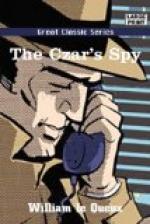“Glad to be back!” he exclaimed, as he helped himself to a “peg.” “I should rather think so, old chap. You know how awfully wearying the life becomes out there. Lots going on down at Palermo, Malta, Monte Carlo, or over at Algiers, and yet we can never get a chance of it. We’re always in sight of the gay places, and never land. I don’t blame the youngsters for getting off from Leghorn for two days over here in town when they can. Three years is a bigger slice out of a fellow’s life than anyone would suppose. But, by the way, I saw Hutcheson the other day. We put into Spezia, and he came out to see the Admiral—got despatches for him, I think. He seems as gay as ever. He lunched at mess, and said how sorry he was you’d deserted Leghorn.”
“I haven’t exactly deserted it,” I said. “But I really don’t love it like he does.”
“No. A year or two of the Mediterranean blue is quite sufficient to last any fellow his lifetime. I shouldn’t live in Leghorn if I had my choice. I’d prefer somewhere up in the mountains, beyond Pisa, or outside Florence, where you can have a good time in winter.”
Then a silence fell between us, and I sat eating on until the end of the meal, wondering how to broach the question I so desired to put to him.
“I shall try if I can get on recruiting service at home for a bit,” he said presently. “There’s an appointment up in Glasgow vacant, and I shall try for it. It’ll be better, at any rate, than China or the Pacific.”
I was just about to turn the conversation to the visit of the mysterious Lola to Leghorn, when two men he knew entered the dining-room, and, recognizing him, came across to give him a welcome home. One of the newcomers was Major Bartlett, whom I at once recollected as having been a guest of Leithcourt’s up at Rannoch, and the other a younger man whom Durnford introduced to me as Captain Hanbury.
“Oh, Major!” I cried, rising and grasping his hand. “I haven’t seen you since Scotland, and the extraordinary ending to your house-party.”
“No,” he laughed. “It was an amazing affair, wasn’t it? After the Leithcourts left it was like pandemonium let loose; the guests collared everything they could lay their hands upon! It’s a wonder to me the disgraceful affair didn’t get into the papers.”
“But where’s Leithcourt now?” I asked anxiously.
“Haven’t the ghost of an idea,” replied the Major, standing astride with his hands in his pockets. “Young Paget of ours told me the other day that he saw Muriel driving in the Terminus Road at Eastbourne, but she didn’t notice him. They were a queerish lot, those Leithcourts,” he added.
“Hulloa! What are you saying about the Leithcourts, Charley?” exclaimed Durnford, turning quickly from Hanbury. “I know some people of that name—Philip Leithcourt, who has a daughter named Muriel.”
“Well, they sound much the same. But if you know them, my dear old chap, I really don’t envy you your friends,” declared the Major with a laugh.




